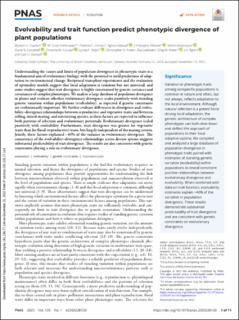Evolvability and trait function predict phenotypic divergence of plant populations
Opedal, Øystein Hjorthol; Armbruster, Scott; Hansen, Thomas Fredrik; Holstad, Agnes; Pelabon, Christophe; Andersson, Stefan; Campbell, Diane R.; Caruso, Christina M.; Delph, Lynda F.; Eckert, Christopher G.; Lankinen, Åsa; Walter, Greg M.; Ågren, Jon; Bolstad, Geir Hysing
Peer reviewed, Journal article
Published version
Permanent lenke
https://hdl.handle.net/11250/3040666Utgivelsesdato
2023Metadata
Vis full innførselSamlinger
- Institutt for biologi [2516]
- Publikasjoner fra CRIStin - NTNU [37304]
Originalversjon
10.1073/pnas.2203228120Sammendrag
Understanding the causes and limits of population divergence in phenotypic traits is a fundamental aim of evolutionary biology, with the potential to yield predictions of adaptation to environmental change. Reciprocal transplant experiments and the evaluation of optimality models suggest that local adaptation is common but not universal, and some studies suggest that trait divergence is highly constrained by genetic variances and covariances of complex phenotypes. We analyze a large database of population divergence in plants and evaluate whether evolutionary divergence scales positively with standing genetic variation within populations (evolvability), as expected if genetic constraints are evolutionarily important. We further evaluate differences in divergence and evolvability– divergence relationships between reproductive and vegetative traits and between selfing, mixed-mating, and outcrossing species, as these factors are expected to influence both patterns of selection and evolutionary potentials. Evolutionary divergence scaled positively with evolvability. Furthermore, trait divergence was greater for vegetative traits than for floral (reproductive) traits, but largely independent of the mating system. Jointly, these factors explained ~40% of the variance in evolutionary divergence. The consistency of the evolvability–divergence relationships across diverse species suggests substantial predictability of trait divergence. The results are also consistent with genetic constraints playing a role in evolutionary divergence. adaptation | evolvability | genetic constraints | macroevolution

